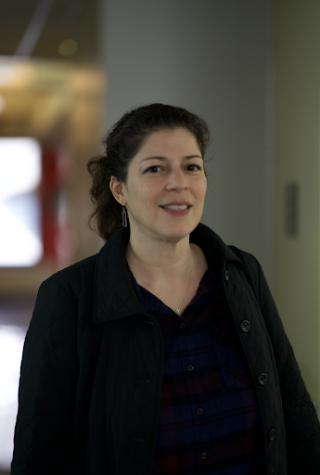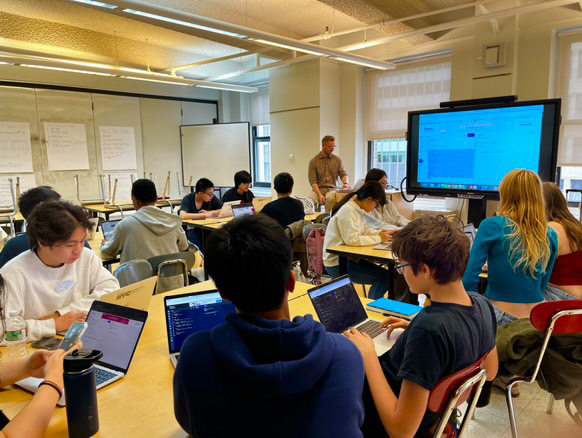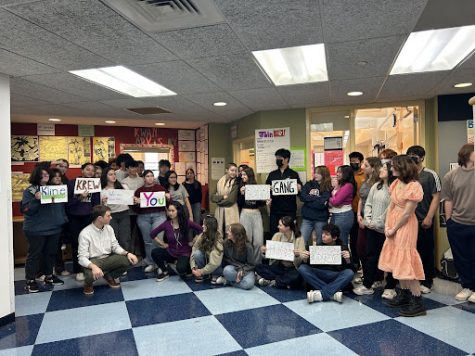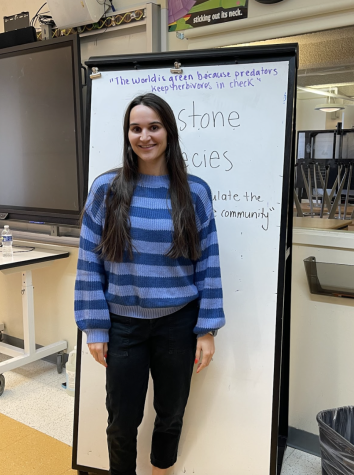Ms. Toulatos Teacher Feature
 What made you want to become a Spanish teacher? Did you have any other careers in mind?
What made you want to become a Spanish teacher? Did you have any other careers in mind?
“Before I was a Spanish teacher I worked in the corporate world and I also managed my family’s business so I basically worked two full time jobs at the same time. Working with my family’s business was very stressful because it was a restaurant and that is 24/7 people calling out consistently; you’re never off. You never don’t have stress. In the corporate world I had a very positive experience using my spanish but that company was bought out and then I worked for a private company and there was a lot of mistreatment of people. So I decided if I was going to be working that hard for other people taking my credit and for people to be treated badly, I atleast wanted to have a job where I felt like I could have an impact or make a difference in a positive way. And I decided to go [in]to teaching. So I applied for the New York city teaching fellows,… and I chose elementary education because I love children and also Spanish, because that was my major in college. And that [was] where I was using my professional degree anyway in the real world. When they accepted me, they accepted me for Spanish. [By] seeing what foreign education is like in this country I realized there are very very few good foreign language teachers because no one takes it seriously so I feel more than ever that I actually do have a chance to make an impact and teach people how to do something that everybody takes for granted with all the technology that is basically robbing people of their own way of thinking and do things on their own. That’s how I came to be a Spanish teacher: bad corporate experiences and a need for a career change.”
What’s your favorite part of being a teacher?
“Believe it or not as much as I yell, scream and holler at kids, it is the students. I do love them truly. I don’t bother with giving them a hard time unless I actually feel like it’s worth it. I think that you’re young and growing and in dire need of some really honest feedback on how to be. Because I think these days a lot of people walk on eggshells and don’t really tell people straight like what they’re doing right, what they’re doing wrong. And so ya it might surprise some people to know but my favorite part of the job is in the classroom with the students.”
Learning a language can be hard. What do you recommend to help anyone struggling in your class?
“You know taking risks and saying you’re going to make mistakes is the number 1 most important thing a person can do. Any immigrant or any person who has been in a new place where they don’t speak the language, can tell you that it is actually the moments of success where you got it right where it sticks like ya that’s the way you do it, thats whats gonna make you get the thing you’re looking for, saying it right, successful communication and then the moments where you make the mistakes and your now noticing oh oh I didn’t get what I was supposed to I didn’t accomplish what I was supposed to with my communication. Those are such memorable moments because you never want to repeat that mistake again and you’re actually aware of the consequences of the error. The communication is faulty; and in class students hide behind each other, sliently not sharing answers, waiting for someone else to do something before they do it and they are afraid to test themselves on whether they actually know it or not. So they’re hiding behind their fear of failure but what they are not realizing is that they’re also missing that personal miss and the opportunity for success that’s actually quite addictive and rewarding because if you actually tried it you might find that you do know how to do it well. So both moments, both successes and the misses are the memorable moments that make us learn things faster and sort out in our brain how to say it right, how to do it right, do I understand what i’m hearing, etc.”
Sometimes native speakers entire your class and think that it will be easy. How do you challenge native speakers in the class and considering you’re also a native speaker with greek?
“So one of the things that I realized as a multi-lingual person growing up is that there’s always something left to learn. When I was in elementary school I was given a foundation in English and grammar and I felt like the more I learned the more my communication improved, my writing became more sophisticated and more refined and I was able to really make my ideas stand out because they were expressed in a very specific and accurate way. And as a greek speaker I went to greek school in my family’s attempt to preserve our culture and our language. And I would notices that there was a difference between the way something sounded to me on an everyday bases and the way it appeared in a written text and it really highlighted for me that my greek at home while it was good and strong and fluent was not as refined as my english was becoming and was not as sophisticated so there was a gap there could be filled with explanation with practice with education and so when I approach my native speakers I met with resistance and sometimes they think there’s nothing to be learned and others are actually really hungry to learn because they do have that experience of kind of knowing but never feeling really confident and if you approach it with the open attitude that I approached my greek education that there is always something left to learn then you will embrace and realize that you are constantly improving yourself just like you can improve yourself in english you can improve yourself in your second language or your third language and all it does is it makes you more articulate and sophisticated. There is nobody who could not benefited from more practice more knowledge more insight in a language”
What would you like to say to anyone thinking of joining AP Spanish?
“If you are not a person who is willing to take the risks or receive constructive criticism then to not even bother. Because you know it’s about wanting to refine your Spanish at a college level and we do not sit and learn all the conjugations of grammar. We sit and we exercise all the things we’ve learned. Putting everything together to actually achieve something greater to talk about something beyond not just “how do you say in Spanish”. We are having discussions about current world issues and concerns. Things that really divide and connect people and having a meaningful input on it… a vehicle for us to communicate much more elevated ideas and if you’re not willing to refine that language so that your actual communication of those ideas will come out accurately; it’s not the class for you.”
What’s the most important thing incoming freshmen need to know about you or your class?
“Spanish is not fiesta time, it is not, here’s a worksheet and fill it out time, it is not the light class, the non class, the unimportant class. It is actually equally important and equally weighted as your other classes and it will probably challenge you more so than your [other] classes for the mere fact that you’re not used to that or not expecting that [to] come from foreign language based on the way it is often treated in middle school. It’s often a culture shock for a lot of our freshmen and I think that they are at first surprised and scared by it and then as they see how much they learn not only by the Spanish language but also by the english language. I think that there is a little stage of time when they do at least appreciate it and start to feel satisfied that blanks are being filled in that they never [have]. And then when they start to understand things, even the ones that are struggling, there’s a satisfaction in it that my teacher is not expecting things of me but is also working with me so that I can learn. Whether they engage or not I feel like there is some level of respect there that they didn’t expect.”
Hi! My name is Mara, and I’ve been a part of The Millennium Phoenix since my Freshman year. I’ve been a writer, a website manager, an editor, and now...



